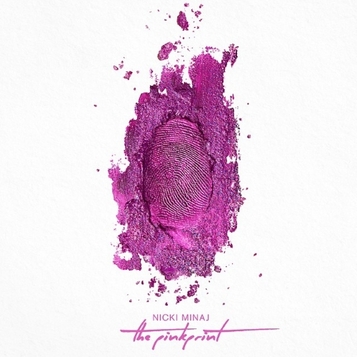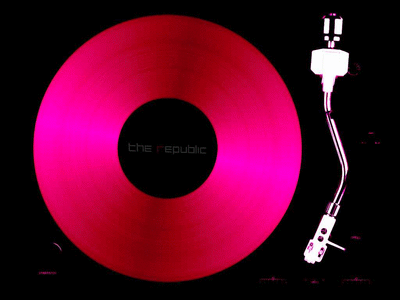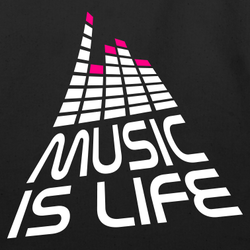
Favorites: All Things Go, The Crying Game, Feeling Myself, Bed of Lies, Truffle Butter
Dislikes: Big Daddy
Overall: Her best work; incredibly revealing and aggressive, appeals to all her fan types
When I heard that Nicki Minaj would be naming her new LP The Pink Print, after the heavily-worshipped 2001 The Blueprint by the heavily-worshipped Jay-Z, I worried that it was a little premature. She accomplished much in a short time, but still was only on her 3rd album. Plus, after the very novel “Anaconda,” that glamorized sleeping around with drug dealers for their money instead of seeking independent success (which contradicts what she represents and touts), I anxiously crossed my fingers that the album would live up to its namesake. If it did, it would be symbolically monumental for female rap. Not only does The Pink Print meet its tall order, it’s Minaj’s best…and maybe 1 of 2014’s best. The most beloved records are those that force listeners to drop their facades and unmask their inner Boogie Man; after all, the primary reason we listen to music and invest so much into an artist is because they carry our stories. It’s nearly impossible to not, as the kids say, “get in your feelings,” as Minaj grants us access to the most shielded parts of her heart and life. On the opening track alone (“All Things Go”) she raps about avoiding inauthentic vipers, an engagement that never progressed to a marriage, the murder of her cousin, feeling that she’s neglected her family in working and an abortion or miscarriage at age 16. This amount of disclosure is astonishing from a notoriously private woman whose image has been systematically built on being an everlasting enigma. To give just a hint of this, Minaj told Marie Claire in August 2013 “I don't have a man,” but in discussing the relationship that inspired some of her breakup material with New York’s 105.1’s Angie Martinez, she says she hadn’t been in single in 15 years (2 consecutive relationships; the latter a 10 year courtship).
Riddle no more; behind the playful eccentricities is a woman unsettled and interrupted. Her romantic profile here is a toss of dark, longing, wounded and fearful. She expresses desiring and fearing love all at the same time, pretending to be detached for self-preservation (ex. “I Lied,” “Buy a Heart” ), grieving a love untangling (ex. “Put You in Room”) and the lethal combination of hurt and rage after betrayal, usage and abuses (ex. “Mona Lisa,” “Bed of Lies”). To me, “The Crying Game” (starring the smoldering vocals of Jessie Ware) was the most striking and startling of the heartbreak hotel set, citing an environment of intravenous drugs and flying tempers turned physical that left me wondering how literal the metaphors actually were. References to substances are thickly applied throughout the album, from sexual analogies, to depictions of recreational and coping mechanism use. This prompts concern about Minaj’s health, especially when she confessed to “contemplating overdosing” on “Lies.” “Crying” also carried another common thread: guilt. Minaj seems to blame herself and her career pursuits for the failures of and shortcomings in her interpersonal relationships, as heard on “Go,” “Lied,” and “Heart.” Shifts in her bonds are burdening on her spirit, as she frequently harps on loyalty, or the lack thereof (ex. “Pills N Potions,” “Shanghai”).
While on the daytime talk-show “The Real” (December 19), Minaj encouraged listeners not to skip through tracks so they won’t miss the story she was trying to tell. I understand her point, as certain songs have a completely different feel outside of their track listing. For instance, “Get on Your Knees” with Ariana Grande is simply a cunnilingus carol (a little holiday humor) by itself, but within context, she is trying to regain some sort of control and escape reality by entering ecstasy. It’s almost uncomfortable seeing Minaj in such a vulnerable setting, given her usual bold presence. Don’t mistake it though; Wonder Woman may have feels, but she’s still a superhero. Minaj transitions in and out of sentimentality throwing bows. As Jay-Z was on The Blueprint 3, Minaj is a tad pissed that she’s regarded as if she’s achieved nothing and that no one’s presented formidable competition (ex. “Want Some More,” “Win Again.”) She goes on to accuse her opponents of mimicking her and doing the same things they criticize her for, trying to come up. She defends her position that, contrary to constant assertion, she is indeed skilled in flow and at penning rhymes. There’s been respectable and promising growth in this area. It seems words aren’t in place just for the sake of rhyming as much and the punch-lines are less silly, more relevant and connected, versus coming out of nowhere. I chuckle every time I hear “I don’t duck nobody, but tape. That was a setup for a punch-line on duct tape” on “Only” because she appears to be poking fun at randomness (it’s rumored the line is a jab at Iggy Azalea’s alleged sex-tape). Her schemes and patterns aren’t as predictable either and are sometimes heterodox, although she repeats some analogies (namely elements of winter to her jeweled duds). She also has a couple of enjoyable Twista-like, speeding moments (ex. “Feeling Myself” featuring Beyonce`). With her singing, she shocks (in a good way) on “Grand Piano” with lucidity, control and a bit of muscle. Normally, there’s mousiness and too much vibrato. Minaj tweeted that the song is 1 of the record’s most emotional. Knowing it’s so close to her makes me feel like a prick for typing the following, but the “so beautiful you could cry” music is far more afflictive than the words that read straight from the “You Played Me like an Instrument” lyric manual. “Piano” is also 1 of the few songs with any overt non-drum instrumentation. The Pink Print isn’t half as melodic as Minaj’s freshman Pink Friday; there are throbbing and stomping beats everywhere and lots of trap hip-hop. The slickest (and sexiest) furrow is “Favorite” with Jeremih. Musicality is definitely missed, but the production fits Print’s overcast, violent and aggressive personality.


 RSS Feed
RSS Feed